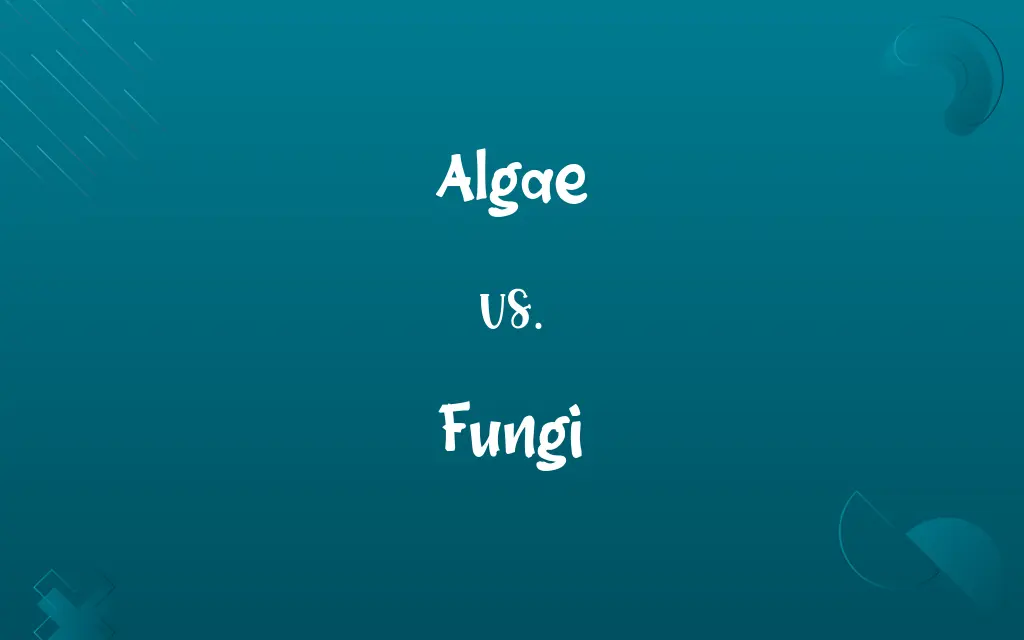Algae vs. Fungi: Know the Difference

By Shumaila Saeed || Updated on December 25, 2023
Algae are simple, primarily aquatic, photosynthetic organisms, while Fungi are a kingdom of mostly terrestrial organisms that absorb nutrients from organic matter.

Key Differences
Algae are photosynthetic organisms found mostly in aquatic environments, and they play a crucial role in producing oxygen and serving as the base of aquatic food chains. Fungi, in contrast, are a diverse group of organisms, including yeasts, molds, and mushrooms, that primarily decompose organic material and are vital in nutrient cycling.
Shumaila Saeed
Nov 19, 2023
Algae range from microscopic phytoplankton to large seaweeds, using sunlight to create their own food through photosynthesis. Fungi do not perform photosynthesis; instead, they absorb nutrients from their environment, often breaking down dead organic material.
Shumaila Saeed
Nov 19, 2023
The cell structure of Algae is generally simple, with some forms being single-celled, while others are multicellular. Fungi have more complex cellular structures, including a network of filaments called hyphae, and their cells have distinct nuclei.
Shumaila Saeed
Nov 19, 2023
Algae can be found in a variety of water bodies, from oceans to freshwater ponds, and are essential for maintaining aquatic ecosystems. Fungi are mostly terrestrial and are found in diverse environments, from soil to decaying matter, and even in symbiotic relationships with other organisms.
Shumaila Saeed
Nov 19, 2023
The reproduction of Algae can occur both sexually and asexually, and many types of algae are mobile, using flagella to move. Fungi primarily reproduce through spores, which are often adapted to travel long distances through air or by other means, and they are generally non-motile.
Shumaila Saeed
Nov 19, 2023
ADVERTISEMENT
Comparison Chart
Nutrition
Photosynthetic, producing their own food
Absorptive, decomposing organic material
Shumaila Saeed
Nov 19, 2023
Cell Structure
Simple, can be single-celled or multicellular
More complex, with hyphae and distinct nuclei
Shumaila Saeed
Nov 19, 2023
Role in Ecosystem
Oxygen production, base of food chains
Decomposers, nutrient cycling
Shumaila Saeed
Nov 19, 2023
Reproduction
Sexual and asexual, often mobile
Primarily through spores, non-motile
Shumaila Saeed
Nov 19, 2023
ADVERTISEMENT
Importance
Essential in aquatic ecosystems
Vital in soil health and decomposition
Shumaila Saeed
Nov 19, 2023
Interaction with Humans
Source of food, biofuel
Food (mushrooms), antibiotics, decomposers
Shumaila Saeed
Nov 19, 2023
Cellular Composition
Chlorophyll for photosynthesis
Lack chlorophyll, have chitin in cell walls
Shumaila Saeed
Nov 19, 2023
ADVERTISEMENT
Algae and Fungi Definitions
Algae
Simple photosynthetic organisms, often found in aquatic environments.
The pond was teeming with green algae.
Shumaila Saeed
Nov 17, 2023
Fungi
Decomposers that absorb nutrients from their surroundings.
Soil fungi contribute to the health of ecosystems.
Shumaila Saeed
Nov 17, 2023
Algae
Aquatic plants that produce oxygen through photosynthesis.
Algae contribute significantly to the oxygen in our atmosphere.
Shumaila Saeed
Nov 17, 2023
Fungi
Non-photosynthetic organisms that reproduce through spores.
Fungi spores can travel long distances through the air.
Shumaila Saeed
Nov 17, 2023
Algae
Diverse group of plant-like organisms, important in ecosystems.
Marine algae are essential for coral reef health.
Shumaila Saeed
Nov 17, 2023
Fungi
A kingdom of organisms that includes molds, mushrooms, and yeasts.
Fungi play a crucial role in decomposing organic matter.
Shumaila Saeed
Nov 17, 2023
Algae
Photosynthetic, mostly aquatic organisms, varying greatly in size and form.
Seaweeds are a large form of algae.
Shumaila Saeed
Nov 17, 2023
Fungi
Organisms with a complex cellular structure, including a network of hyphae.
The forest floor was covered with fungi, including various mushrooms.
Shumaila Saeed
Nov 17, 2023
Algae
Water-based organisms, ranging from single-celled to multicellular forms.
Microscopic algae form the basis of the aquatic food chain.
Shumaila Saeed
Nov 17, 2023
Fungi
A diverse group that forms symbiotic relationships with other organisms.
Some fungi form beneficial relationships with tree roots.
Shumaila Saeed
Nov 17, 2023
Algae
Any of numerous photosynthetic organisms of aquatic or moist habitats, ranging in size from single-celled diatoms to large seaweeds such as kelp, and characterized by a lack of complex organs and tissues. Once classified within the plant kingdom, the algae are now considered to include several unrelated groups belonging to different kingdoms.
Shumaila Saeed
Oct 19, 2023
Fungi
(pathology) Spongy, abnormal growth, as granulation tissue formed in a wound.
Shumaila Saeed
Oct 19, 2023
Fungi
A style of folk and popular music from the Virgin Islands, traditionally performed by bands consisting of banjo, guitar, ukulele, and washboard with various percussion instruments on rhythm.
Shumaila Saeed
Oct 19, 2023
Algae
Primitive chlorophyll-containing mainly aquatic eukaryotic organisms lacking true stems and roots and leaves
Shumaila Saeed
Oct 19, 2023
Repeatedly Asked Queries
How do Algae and Fungi differ in habitat?
Algae are mainly found in aquatic environments, while Fungi are mostly terrestrial.
Shumaila Saeed
Nov 19, 2023
What is the main nutritional difference between Algae and Fungi?
Algae are photosynthetic, creating their own food, whereas Fungi absorb nutrients from their environment.
Shumaila Saeed
Nov 19, 2023
What are Algae?
Algae are primarily aquatic, photosynthetic organisms, ranging from single-celled to multicellular forms.
Shumaila Saeed
Nov 19, 2023
What is the ecological role of Fungi?
Fungi are vital decomposers and play a significant role in nutrient cycling.
Shumaila Saeed
Nov 19, 2023
What are Fungi?
Fungi are a kingdom of organisms that include molds, mushrooms, and yeasts, known for decomposing organic material.
Shumaila Saeed
Nov 19, 2023
Can both Algae and Fungi be multicellular?
Yes, both can be multicellular, but they have different structures.
Shumaila Saeed
Nov 19, 2023
What role do Algae play in the ecosystem?
Algae produce oxygen and are a key part of aquatic food chains.
Shumaila Saeed
Nov 19, 2023
Can Algae be harmful?
Some algae, like blue-green algae, can be harmful and produce toxins.
Shumaila Saeed
Nov 19, 2023
Are Fungi important for human use?
Yes, Fungi are used in food, medicine (like antibiotics), and as decomposers.
Shumaila Saeed
Nov 19, 2023
How do Algae reproduce?
Algae reproduce both sexually and asexually, with some forms being mobile.
Shumaila Saeed
Nov 19, 2023
How do Fungi reproduce?
Fungi primarily reproduce through spores and are generally non-motile.
Shumaila Saeed
Nov 19, 2023
Are all Fungi decomposers?
While many are decomposers, some Fungi form symbiotic relationships with other organisms.
Shumaila Saeed
Nov 19, 2023
What are common examples of Algae?
Common examples include phytoplankton and seaweeds.
Shumaila Saeed
Nov 19, 2023
What are common examples of Fungi?
Examples include mushrooms, molds, and yeasts.
Shumaila Saeed
Nov 19, 2023
Do Algae and Fungi have chlorophyll?
Algae have chlorophyll for photosynthesis, but Fungi do not.
Shumaila Saeed
Nov 19, 2023
Do Algae contribute to biofuel production?
Yes, some algae are used in the production of biofuels.
Shumaila Saeed
Nov 19, 2023
Can Algae live in extreme environments?
Some algae can thrive in extreme environments like hot springs.
Shumaila Saeed
Nov 19, 2023
Are Algae considered plants?
Algae are plant-like but are classified separately due to their simple structure.
Shumaila Saeed
Nov 19, 2023
How do Fungi affect plant health?
Many Fungi form symbiotic relationships with plants, aiding in nutrient absorption.
Shumaila Saeed
Nov 19, 2023
Are mushrooms considered Fungi?
Yes, mushrooms are a well-known type of Fungi.
Shumaila Saeed
Nov 19, 2023
Share this page
Link for your blog / website
HTML
Link to share via messenger
About Author
Written by
Shumaila SaeedShumaila Saeed, an expert content creator with 6 years of experience, specializes in distilling complex topics into easily digestible comparisons, shining a light on the nuances that both inform and educate readers with clarity and accuracy.









































































